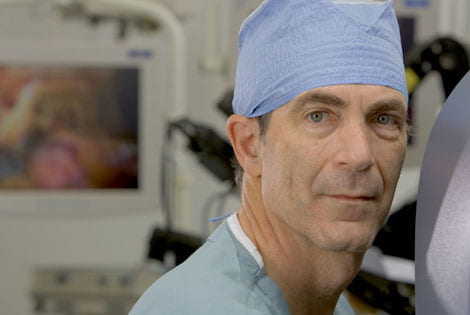Surgical precision
Dr. Ralph Clayman turned a childhood fascination into a lifesaving career

Years ago, when his friends were assembling model airplanes, Ralph Clayman received from his father a different kind of model. What his dad brought home intrigued him and perhaps set a course that has saved the lives of countless patients.
Indeed, Dr. Clayman, who joined UCI Medical Center in 2002 as chair of the new Department of Urology, has come a long way since his dermatologist father first handed him a model of a kidney.
“I found it interesting,” says the native New Yorker, smiling. “That’s the only thing that even remotely relates to my eventual decision to work with kidneys for a living.”
In fact, it’s more than just a living — it’s a calling. Just two years ago, that calling rerouted him to UCI, where he since has guided the university to a position of national leadership in minimally invasive surgery.
To his father’s probable delight, the model kidney appears to have stuck.
HEEDING THE CALL
Reared in New Jersey, Clayman earned his medical degree at UC San Diego. He eventually joined Washington University in St. Louis, becoming a professor of urology and radiology, director of the Midwest Stone Institute, and co-director of minimally invasive surgery. There he and his colleagues performed the world’s first removal of benign and cancerous kidneys using a laparoscope — a tube-like device enabling surgery through a small incision — and the first laparoscopic removal of a cancerous kidney and ureter.
In January 2002, however, UCI was looking to establish a Department of Urology. Clayman was appointed chair.
“There already was a very strong faculty, and Dean Cesario had a willingness to recruit renowned urologists, an interest in creating a department that encompassed clinical care, research and education, and genuine enthusiasm in taking urology at UCI to the next level” Clayman recalls. “It was a wonderful chance to create one of the first departments of minimally invasive urology in the country.”
Today, the department’s entire faculty is devoted to minimally invasive surgical techniques. Clayman’s own focus involves using these kinder, gentler methods to treat renal cancer, ureteral strictures — a narrowing of the canal leading away from the kidney to the bladder — and kidney stone disease. Other surgeons throughout UCI Medical Center’s new center of excellence are doing similar work in their disciplines with regard to minimally invasive surgery.
LESS INVASIVE, MORE BENEFICIAL
“Most of our work is being done less invasively,” he says, adding that smaller incisions result in less patient trauma, markedly reduced pain, better cosmesis and a faster recovery. “Why make a 12-inch incision to get to a 4-inch organ to remove a 1-inch-long tumor?”
That’s what Gerald Mayes, 75, of Orange, wanted to know. Two years ago, Clayman removed Mayes’ cancerous kidney laparoscopically. Mayes, whose gall bladder had been removed in a conventional surgical procedure, called the laparoscopic procedure “a piece of cake.” “There was nothing to it,” he says. “The man’s a genius. He saved my life.”
Since arriving in Irvine, Clayman has forged ahead in other areas as well. For example:
- The department now employs two da Vinci Surgical Systems, one dedicated to training and evaluating surgeons. Reproducing the movements of a human wrist, the state-of-the-art robotic system eliminates tremors and improves dexterity — permitting finer and possibly better surgery. UCI is one of only two robotic training centers in Southern California.
- A newly developed mini-residency program enables urologists nationwide to take weeklong courses focusing on trauma-minimizing procedures. Under the guidance of Dr. Elspeth McDougall, the program is the first of its type in the country. Already, urologists from 16 states and eight countries have availed themselves of this experience.
- The department is one of few anywhere investigating the evaluation of surgeons for credentialing and recertification using the robot and surgical simulators — work that could eventually improve surgical outcomes everywhere.
- UCI urology researchers Darren Tyson and Chung Lee, along with Drs. McDougall and Clayman, are examining ways to bioengineer tissue to repair or replace damaged or cancerous bladders, work that eventually could save many lives. This team also is investigating the development of a cell-free artificial bladder.
“The key to our progress has been the ability to speak with diverse people at UCI about new ideas and equipment,” Clayman says. “People here have welcomed the acquisition of the robotic system and embraced the concept that UCI should become a leader in new technologies and minimally invasive surgery.”
Indeed, progress has been swift, and the impact on patients in California and nationwide substantial. Many are alive today because of the talented team of clinicians who work in the Department of Urology.
“Dr. Clayman’s presence has elevated UCI to national prominence,” says McDougall, professor of urology. “The mini-residency program already is recognized worldwide as a unique learning experience.”
UCI School of Medicine Dean Dr. Thomas Cesario agrees: “Ralph Clayman is internationally respected. His presence here has given UCI substantial prestige.”
In Clayman’s mind, it all boils down to three areas: education, research and clinical care.
“In coming here, I wanted to create a department of excellence in all three areas,” he says. “This is an out-standing university, and my job is to teach, to search, to administer care, and to enable my faculty to do likewise. To accomplish these goals, I’m endeavoring to promote and attract the very best experts in urology to UCI.
“Our competition is disease. Our goal is to overcome disease and provide the very best, least painful care available. If we’ve done that at the end of the day, then the day has been well spent.”
